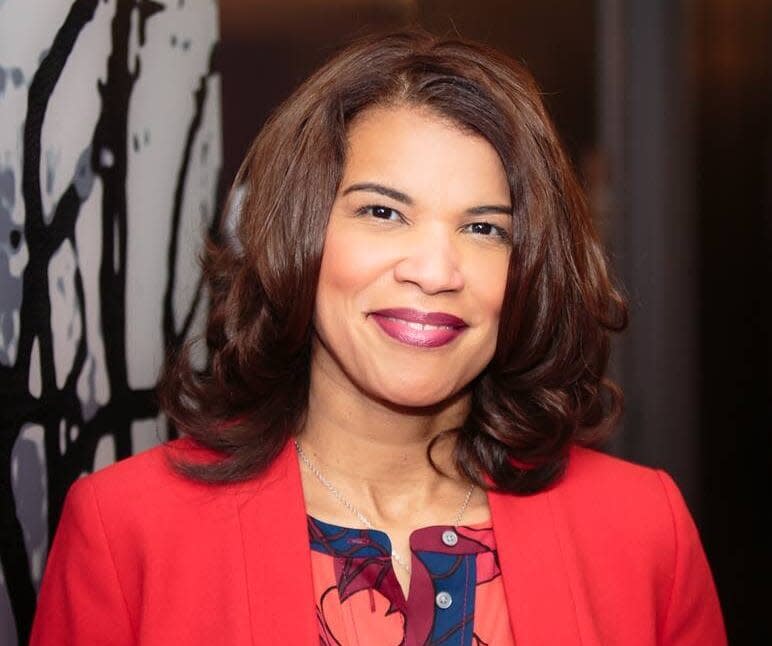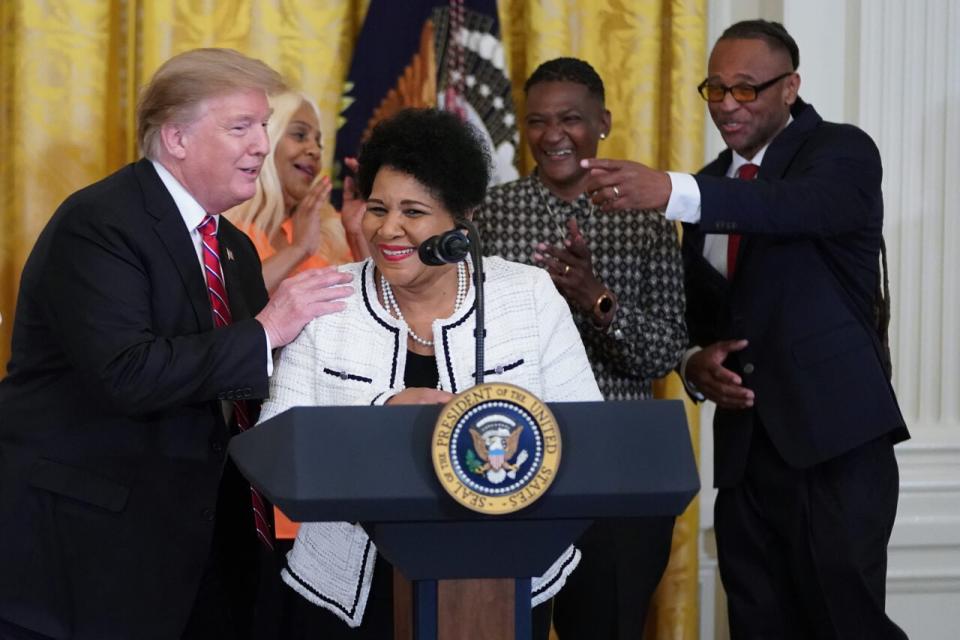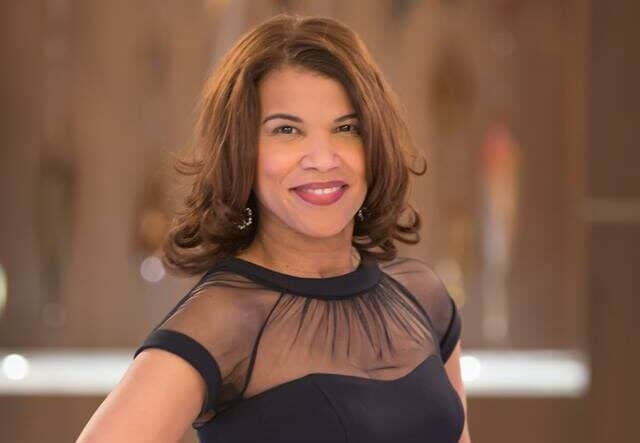Kemba Smith Pradia says America must work to see humanity in formerly incarcerated people as election approaches
The advocate is pushing for all formerly incarcerated people to have the right to vote
Kemba Smith Pradia knows firsthand what it’s like to be denied the right to vote.
The social justice advocate was just 23 years old when she was sentenced to 24.5 years in prison after becoming involved in her abusive boyfriend, Peter Hall‘s, drug activities. The former Hampton University student had no prior criminal record and was seven months pregnant when she was sentenced.
Just like that, Smith was no longer allowed to vote in her home state of Virginia.
“To have been incarcerated for six and a half years, and then to get out, work a job, pay taxes, be an upstanding citizen, and to a certain extent, be a public figure and still 10 years after my release, I still wasn’t able to vote in the state of Virginia,” the Poster Child: The Kemba Smith Story author explained exclusively to theGrio.
Read More: Florida AG requests investigation into Bloomberg felon voter donation
According to the Sentencing Project, “5.2 million Americans are forbidden to vote because of felony disenfranchisement, or laws restricting voting rights for those convicted of felony-level crimes.”
Thankfully, Smith Pradia was granted clemency from President Bill Clinton in 2000. She was able to petition to get her voting rights reinstated, and although she couldn’t cast her ballot for President Barack Obama in the 2008 election, she was able to vote the following presidential cycle.
“[The 2008 election] was one of the most historic elections—outside of this one—where I couldn’t vote. Obviously, because President Obama was running, but I also had a family friend, [Senator] Tim Kaine, who was running for lieutenant governor. I had to explain to my son when he asked me, ‘Mommy, who are you going to vote for,’ why I couldn’t vote. For me, that was something that was difficult—it made me have a range of emotions, having to explain that to my son.”

She continued, “I didn’t just wallow in my emotions, I still said that I was going to go out and be a part of the ‘Get Out and Vote’ effort and encourage other people, through my experience, to vote. But it was very humiliating on Election Day seeing everybody with their ‘I voted’ stickers, but here I was being treated in my own country like less than. I wasn’t completely whole because I wasn’t able to vote.”
Over the years, Smith has used her voice to advocate for the voting rights of other formerly incarcerated people.
“It is troubling to know that the formerly incarcerated community are included with people who can’t vote [in the US] due to their mental capacity, age or citizenship status. I think it’s inhumane because voting is a basic fundamental human right. Our country should be looking at formerly incarcerated people as human beings and that they should be afforded the right to be a part of the political process,” she said.
“I want to say, in maybe 2011, 2012, I was part of the NAACP delegation that traveled to the United Nations in Geneva, Switzerland three times to talk about voter suppression laws in the US. …In seven states, which is Alabama, Florida, Kentucky, Mississippi, Tennessee, Virginia and Wyoming, more than one in seven African Americans are disenfranchised, twice the national average for African Americans.
She added, “One of the things that Ben Jealous, past president of the NAACP, and myself spoke about with Virginia was the fact that the disenfranchisement laws were originally intended to keep African Americans from voting. …There have been improvements over the years where Virginia now makes it a whole lot easier for people to get their voting rights restored. But it’s still something that’s not automatic.”

One of the improvements in Virginia was Smith Pradia’s appointment to the Virginia Parole Board in 2019. She also is the founder of her own foundation, The Kemba Smith Foundation. She has openly shared her experience and expertise on issues related to criminal justice reform, including her thoughts on the Florida’s Court of Appeals’ decision to overturn a ruling that allowed formerly incarcerated people to vote if they had not paid their court fines and fees.
Previously, Smith worked with Desmond Meade, executive director of Florida Rights Restoration Coalition, who led the movement to pass Amendment 4 in 2018.
“[These restrictions] are targeting our population, our people and it goes beyond race. It’s an issue of class as well. Why should a person—if they can’t afford to pay their fines and fees—not be afforded to [the right] vote? Again, I think it’s a political ploy,” Smith Pradia said. “I was glad to see LeBron James investing in helping formerly incarcerated people in that state by donating money to pay their fines and fees, and encouraging other influential people to do the same.”
Smith isn’t afraid to address public figures, including President Donald Trump, about their stance on criminal justice. The president recently received support at the Republican National Convention from Alice Johnson, a formerly incarcerated woman who was granted clemency from Trump in 2018 after serving 21 years of a life sentence.
Smith Pradia told theGrio that she understands the amount of gratitude one can have after being freed from prison.
“I’ve thought deeply about the position that Alice Johnson is in. I watched the Republican National Convention and I was an advocate of Alice Johnson,” the activist explained. “In the ’90s when I was incarcerated, there was a grassroots movement advocating for my release during a time when there was no social media. When President Clinton granted my commutation, I was Alice Johnson. I was so grateful and indebted to the man that released me after six and a half years, in 2000, when my son was 6 years old.

“When I was supposed to stay in prison until my son was a grown man. I wasn’t supposed to be released until 2016. I was singing praises and saying how grateful I was to President Clinton. It really wasn’t until I read and continued to work in the movement, where I started to be more informed and could empathize with some people that really didn’t like me saying positive things about President Clinton.”
She continued, “I understood that I was part of the prison boom from the legislation of the crime bill that President Clinton signed. And so, when I think about Alice Johnson and other people that are giving President Trump praise for what he’s done, I can’t take away what Trump has done as far as giving them their freedom. Like that’s the greatest gift–it’s a miracle, essentially, a gift of mercy. But for me, it’s very hard to just single that out and not look at the total position of where our country is now. To be quite honest, this only makes me want to put more fire under the Democrats. I think that’s where I hold both parties responsible, and there needs to continue to be bipartisan support as it relates to criminal justice reform.”
Smith Pradia hopes that “miracle” can also touch her friend, Michelle West, who is serving two life sentences plus 50 years in a California prison after being convicted for drug-related crimes in 1994. Due to mandatory minimum sentencing guidelines, Smith Pradia and West both received unbelievably long sentences on their first offense. West has already served over 27 years. She was the first person who told Smith that she was going to be released in 2000.
“When I hear that [Trump’s] done commutations, I’m always praying that I’ll hear Michelle West’s name. That I’ll see her name in the press, because she was actually the first person when I was inside that told me that I was going to be released because she heard it on CNN,” Smith Pradia, who is approaching the 20-year anniversary of her release, said. “You know, I have survivor’s guilt for people that I know that are still in and so many people that deserve the opportunity for a second chance as well.”

Smith Pradia is working with other organizations to get West released and hopes that West can have her voting rights reinstated immediately once she is free. The author is also juggling her role as a wife and mother, with one adult son studying for his masters degree in Europe and one young daughter studying virtually from home. While it may seem overwhelming for some, Smith Pradia is happy to use her experience to help others.
“I know how much NAACP Legal Defense Fund invested in my release, and it wasn’t with hopes of just for my freedom. It was because the fastest growing population [in prison] at the time were Black women and they hoped that my case would set a precedent for others,” the activist said, adding that her loving parents provided her with unconditional support. “So ever since my release, I just hope that everyone can see that I’ve been committed to trying to help other people, bring other people’s stories to the forefront.”
She continued, “In the past, criminal justice reform wasn’t something that was talked about when I first came home. I’m glad that we have moved to a place in our country where this is talked about. …It’s just very inspiring to have a community now of formerly incarcerated people who are starting to lead this movement.. It’s my hope that we could move in the direction [of full voting rights for all]. It’s what I continue to speak out for, and why I continue to use trauma-informed leadership, in sharing my own personal experience, to try to move other people to understand its importance.”
If she could go back to where “Kemba’s Nightmare” began when she was a college student who became involved with Hall, Smith says she would tell herself one very important thing: Love yourself.
Read More: City Girls rapper JT frustrated she can’t vote in election due to felon status
“The advice that I would give my then-self would be to love me, not a relationship. Go to counseling to deal with the trauma that I experienced with being in an abusive relationship so that I could have safely walked away. Along with loving myself, focus on my dreams and goals and to be 100% politically engaged with a social conscience of what’s going on in our nation. To understand how who we vote into office impacts not only me, but our communities and our future as a nation. The fact of the matter is I wasn’t even registered to vote in college. Hopefully, today, this generation understands just how critical this is.”
Readers interested in joining the fight for criminal justice reform and voters’ rights can visit www.sentencingproject.org. Young people between the ages of 16 to 21 can sign up for the Kemba Smith Foundation’s virtual youth program, L.O.V.E. Let Our Voices Educate, commemorating her 20-year anniversary from prison.
Have you subscribed to theGrio’s new podcast “Dear Culture”? Download our newest episodes now!
TheGrio is now on Apple TV, Amazon Fire, and Roku. Download theGrio today!
The post Kemba Smith Pradia says America must work to see humanity in formerly incarcerated people as election approaches appeared first on TheGrio.

